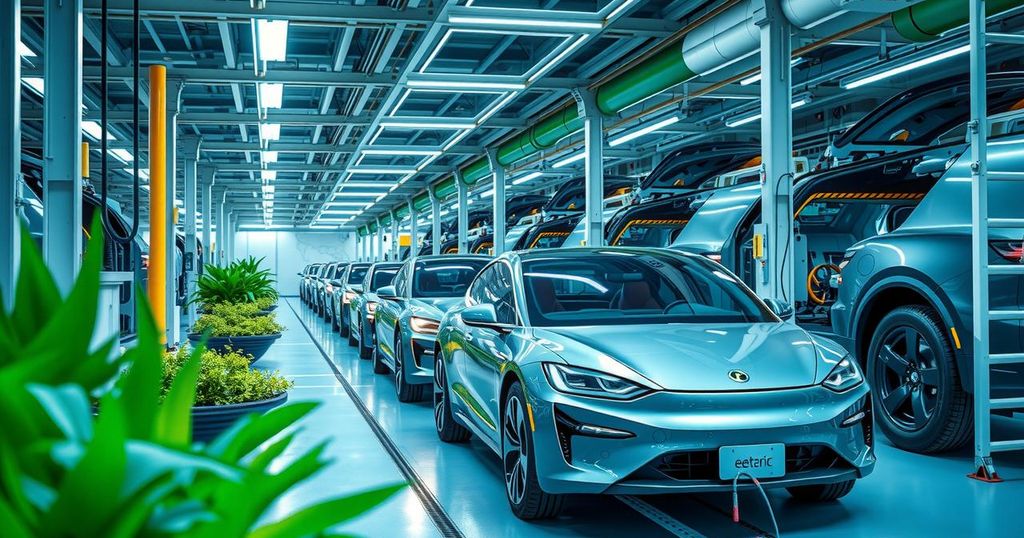BYD Begins Assembling EVs at New Factory in Brazil
- BYD aims to assemble 50,000 EVs by 2025 in Brazil.
- The Bahia plant previously housed a Ford factory purchased in 2023.
- The company has faced delays and regulatory hurdles before opening.
- BYD’s operations will significantly rely on imported kits amidst rising tariffs.
- Labor issues pose serious reputational risks and potential lawsuits for BYD.
BYD Starts EV Assembly in Brazil This Month
Chinese automaker BYD is set to kick off electric vehicle (EV) assembly at its brand new facility in Bahia, Brazil this month. This ambitious project, as outlined by Alexandre Baldy, the senior vice president for BYD in Brazil, targets an assembly output of 50,000 vehicles by the year 2025. A key part of the plan involves utilizing imported kits, which helps cut back on dependency on finished imports, especially as tariffs are on the rise, particularly since the regulatory landscape in Brazil has shifted.
Delays and Regulatory Hurdles Ahead for BYD
Despite BYD’s eagerness to officially launch operations, it is important to note that final regulatory approvals for the factory are still pending at this stage. Earlier in the year, BYD had ramped up its imports of finished vehicles, managing to transport approximately 22,000 units from China before the hike in import taxes that took effect on July 1. The Bahia plant, which occupies the site of a decommissioned Ford plant acquired in 2023, is encountering its fair share of hurdles, including delays and some criticism from local sourcing authorities.
A Decade of Diverse Investment in Brazil
However, BYD’s Brazilian strategy is not a flash in the pan; it has been in the making for nearly a decade, encompassing multiple sectors. The company laid the groundwork as early as 2014 with a healthy investment of $400 million to construct its first battery factory in Brazil. This investment was symbolic, backed by both Chinese President Xi Jinping and Brazilian President Dilma Rousseff. They have not only concentrated on passenger vehicles but also expanded into public transportation, including notable projects like the 20-kilometer SkyRail monorail in Salvador, aimed at servicing a whopping 150,000 daily commuters. By 2024, thanks to this holistic approach, BYD managed to seize over 80% of Brazil’s battery-electric vehicle market, with sales soaring by an impressive 300% year-over-year, crowning them as a significant player in the burgeoning EV market.
Brazil’s Tariff Policy Speeds Up Manufacturing Plans
Time is not on BYD’s side, as Brazil’s strategic tariff policies are influencing their production timeline significantly. The Brazilian government is slowly reintroducing import tariffs on electric vehicles, starting at 0% and projected to climb to 35% by July 2026. This policy change is essentially pressing BYD to kick their manufacturing plans into overdrive, leading them to frontload their imports. In an attempt to counter these impending tax increases, BYD exported 7,300 EVs to Brazil in May 2025, marking their biggest single export operation to the country ever. However, this approach has led to friction with local industry group ANFAVEA, which has publicly criticized BYD for heavily relying on imports instead of fostering local production capacity.
Labor Issues Threaten BYD’s Reputation and Operations
Yet, it is worth noting that labor controversies are looming large over BYD’s burgeoning expansion in Brazil, which present not just operational delays but vital environmental, social, and governance (ESG) risks. Reports have surfaced documenting serious labor violations affecting more than 160 Chinese workers involved in construction at BYD’s site. These violations reportedly include withholding of passports, excessive working hours, and living conditions that have been characterized as ‘slavery-like’ by regulatory bodies in Brazil. The potential legal fallout from these allegations is serious; prosecutors have filed a lawsuit against BYD that could lead to fines of up to $45 million and even a temporary cessation of operations at the proposed $484 million facility in Bahia. This particularly raises alarms about compliance with local labor laws, with Brazil known for having one of the strictest labor enforcement regimes in Latin America, emphasizing the necessity for foreign investors to adhere to sustainable practices.
In summary, BYD is set to start EV assembly in Bahia, aiming for 50,000 cars by 2025 while navigating through the hurdles of local regulations and rising tariffs. Its decade-long diverse investment strategy in Brazil emphasizes a commitment to local manufacturing amidst a challenging compliance landscape marred by labor controversies. The unfolding situation reveals the complexities of international expansion for Chinese firms in Latin America, highlighting urgent needs for sustainability and ethical labor practices.




Post Comment